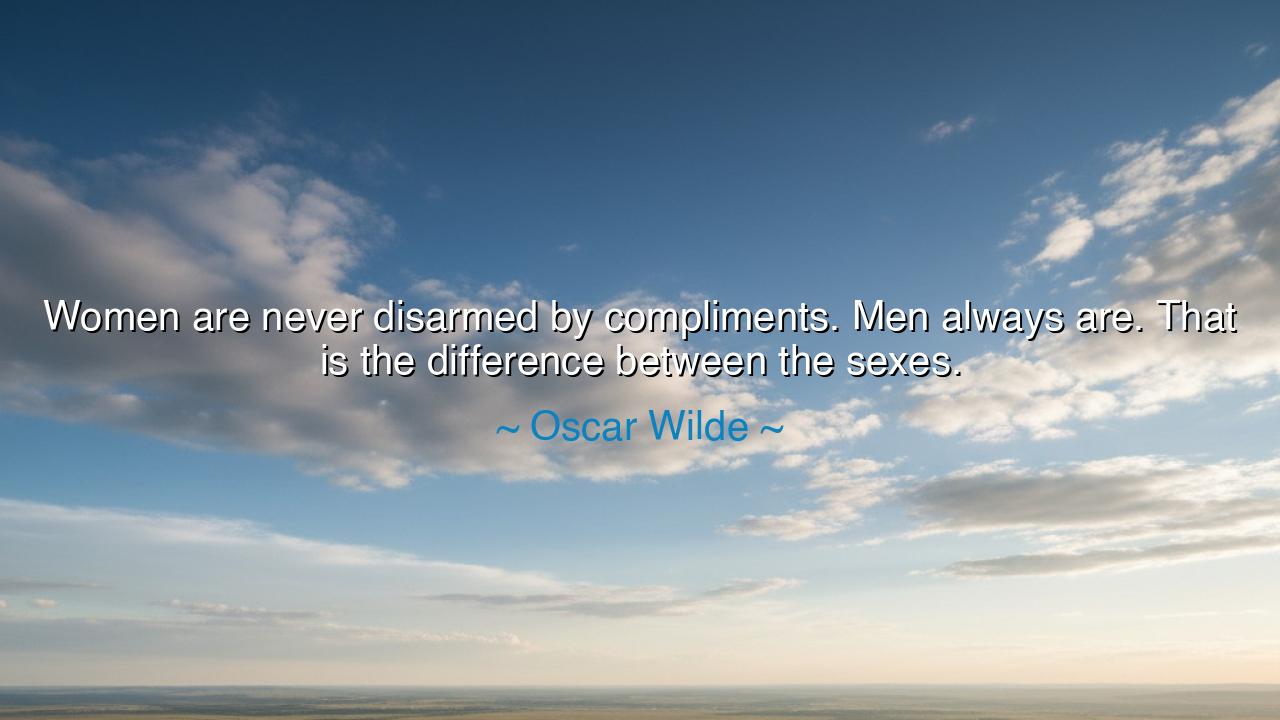
Women are never disarmed by compliments. Men always are. That is
Women are never disarmed by compliments. Men always are. That is the difference between the sexes.






The words of Oscar Wilde — “Women are never disarmed by compliments. Men always are. That is the difference between the sexes.” — sparkle with his trademark wit yet conceal beneath the laughter a keen truth about human nature. Wilde suggests that women, long accustomed to flattery, receive compliments as though they were coins too often spent, smiling but never surrendering their strength. Men, by contrast, more rarely subjected to such adornments, are softened, weakened, even disarmed when praise is offered, their guard lowered by words of admiration.
The meaning of this observation lies in power and perception. Compliments, though seemingly innocent, are tools of persuasion, weapons of charm. Wilde, ever the observer of society’s theater, recognized that women, trained from youth to endure both sincere praise and hollow flattery, develop resilience to its spell. They remain armed, discerning whether words are genuine or deceitful. But men, less tested in this battlefield of words, often mistake compliments for truth, their confidence swayed by the sweetness of approval.
History offers us mirrors of this truth. Consider Cleopatra, who wielded her beauty and wit not only in seduction but in strategy. No praise could truly disarm her, for she knew the weight of words and turned them to her advantage. Contrast this with Caesar, who basked in the flattery of senators and courtiers, so enamored of their compliments that he marched proudly into the Senate House, only to fall beneath their daggers. In Wilde’s eyes, such stories reveal the difference: the woman, armored against praise, remains cautious; the man, undone by it, may stumble to his ruin.
The origin of Wilde’s statement rests in his life as both social critic and artist, a man fascinated by the dance of appearances and realities. In the salons of London, he observed the games of vanity, where compliments were traded as weapons of influence. His quip reflects not only wit but a piercing analysis of how men and women navigate the traps of admiration differently, each shaped by the roles society forced upon them.
Therefore, O seekers of wisdom, take heed of this lesson: praise can be as sharp as the blade, for it cuts not the skin but the spirit. Learn from Wilde’s wisdom to discern flattery from truth, lest your strength be disarmed by words too easily spoken. Let compliments inspire you, but never control you; let them warm the heart, but never blind the mind. For whether man or woman, the soul that remains steady against both scorn and praise is the soul that walks with true power.






TCTu Tran Thi cam
Oscar Wilde’s quote seems to draw on traditional stereotypes of masculinity and femininity, but does it fully capture the complexity of how compliments are received? Could it be that women, just like men, may be disarmed by compliments depending on their own insecurities or needs for validation? How do these gendered expectations shape the way we interact with each other in both personal and professional settings?
THBien Tuan Hung
While Wilde’s quote is humorous, it also raises questions about societal perceptions of gender and vulnerability. Is there a truth to the idea that women are expected to be less affected by compliments, while men are expected to bask in them? Does this expectation lead to men becoming more disarmed when they do receive genuine praise? How can we move away from these rigid gendered responses to compliments and embrace more authentic reactions?
MDHuynh Minh Dang
Wilde’s statement is a playful yet thought-provoking take on gender differences, but does it reduce people to simplistic stereotypes? Compliments, in my experience, can affect people of all genders differently depending on personality and context. How much of this response to compliments is culturally constructed? Can men be just as unaffected by compliments as women, depending on their self-confidence or the nature of the praise they receive?
VPDo Van Phuc
This quote by Wilde is interesting, but it feels like a reflection of a different time and mindset. Today, the way men and women respond to compliments may be more complex. Do men really react more strongly than women to flattery, or is this an outdated view of masculinity and femininity? Could it be that the context—such as the nature of the compliment or the relationship between the individuals—influences how compliments are received?
Tthien
Wilde’s quote plays on the idea that men are disarmed by compliments, while women are immune. But is this really about gender, or is it about how individuals perceive themselves? Could it be that societal expectations place women in a position where they have to appear unaffected, while men are allowed to show vulnerability? Does this dynamic perpetuate a stereotype about how each gender ‘should’ respond to compliments?